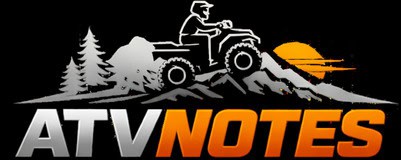Washington’s rugged backcountry, dense forests, and scenic mountain trails make it a paradise for ATV riders. From the Cascade foothills to the trails around Okanogan, off-road adventures are practically a state tradition.
But before revving up and heading out, it’s crucial to know the local rules that govern where and how you can ride. Each state enforces its own regulations on registration, safety gear, and trail access—and Washington is no exception. Ignoring these can easily lead to fines, impoundment, or restricted riding privileges.
This guide breaks down everything you need to stay compliant with ATV laws in Washington state.
Read: Guide to ATV Laws in Michigan for Off-roaders
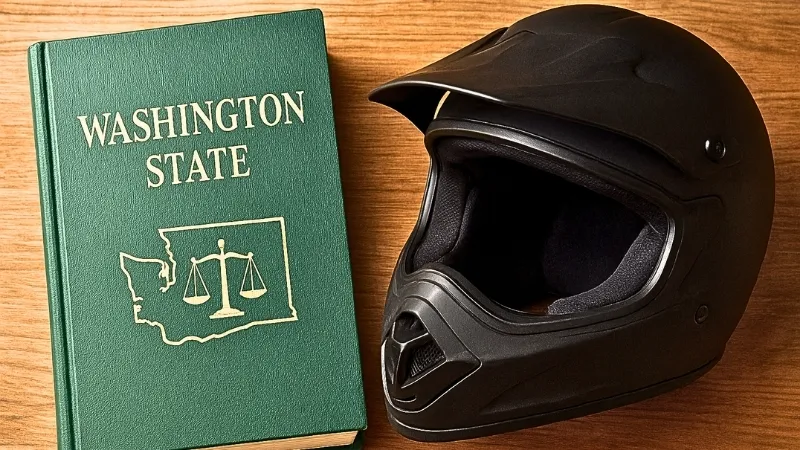
Jump To Contents
- Overview of Washington’s ATV Legal Framework
- Washington ATV Registration
- ATV Street-Legal Requirements in Washington
- Washington State OHV Licensing, Age, and Supervision Rules
- Mandatory Safety Equipment and Operation Rules
- Where You Can Legally Ride ATVs in Washington
- Environmental and Noise Regulations
- Penalties for Violating ATV Laws in Washington
- Cross-State and Nonresident ATV Use
- Resources and Official References
- Final Thoughts: Stay Legal and Ride Smart in Washington
Overview of Washington’s ATV Legal Framework
In Washington, all-terrain vehicles fall under the broader category of Off-Road Vehicles (ORVs), regulated primarily by the state’s Revised Code of Washington (RCW 46.09). This law outlines how ATVs, UTVs, and other off-highway vehicles are defined, registered, and permitted to operate within the state.
Unlike many states, Washington distinguishes between Off-Road Vehicles (ORVs) and Wheeled All-Terrain Vehicles (WATVs)—the latter being ATVs that meet specific equipment standards for limited on-road use. Understanding this difference is key because it affects where and how you can legally ride.
Oversight comes mainly from three agencies:
- The Washington Department of Licensing (DOL) handles registration,
- the Department of Natural Resources (DNR) manages public trails and land access,
- and the Washington Department of Fish and Wildlife (WDFW) oversees riding on designated recreation lands.
Together, these agencies ensure ATVs are used responsibly and in compliance with state law.
Washington ATV Registration
Owning an ATV in Washington means more than just parking it in your garage—you’ll need to get it properly registered and tagged before hitting the trail. The state treats most ATVs as Off-Road Vehicles (ORVs), which must display a valid ORV decal to operate on public lands or trails.
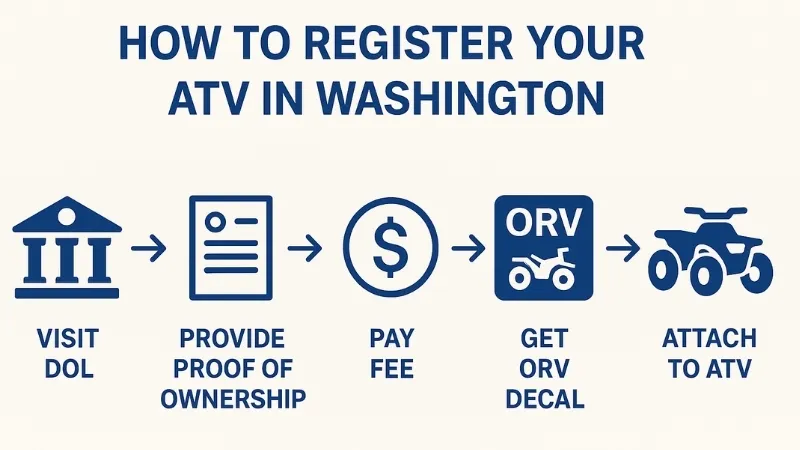
How to Register Your ATV in Washington State?
Registration is handled by the Washington Department of Licensing (DOL). To register:
- Visit a local licensing office or authorized dealer.
- Provide proof of ownership (title or Manufacturer’s Statement of Origin).
- Pay the registration fee and obtain an ORV use permit decal.
- Affix the decal to the rear of your ATV where it’s clearly visible.
Your ORV registration is valid for one year and must be renewed annually. The permit allows access to DNR-managed trails, state recreation areas, and most county-approved ORV routes.
Read: ATV Laws and Regulations in New Mexico State
ATV Street-Legal Requirements in Washington
Washington allows certain ATVs, known as Wheeled All-Terrain Vehicles (WATVs), to be operated on public roads—but only if they meet the state’s equipment and inspection standards. Not every ATV qualifies, and local jurisdictions have the authority to decide whether to allow on-road use within their boundaries.
What Makes an ATV Street Legal in Washington?
To be street legal in Washington, your ATV must be equipped with:
- Headlights, taillights, and stoplights
- Mirrors on both sides
- Turn signals and horn
- Brake system and proper tires
- Spark arrestor and muffler within noise limits
- A clearly visible license plate and ORV tag
These features ensure visibility, reduce noise, and align with RCW 46.09.457, which governs WATV on-road operation.
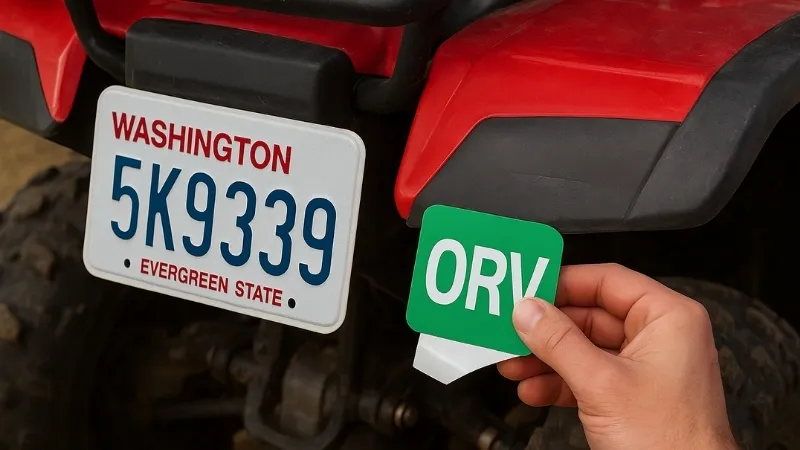
ORV Plates for Street-Eligible Vehicles
If you’ve modified your ATV to meet Wheeled All-Terrain Vehicle (WATV) standards, you can apply for an ORV metal plate instead of just a decal. This plate permits limited on-road use in approved counties and cities.
Proper registration isn’t just red tape—it’s your proof of compliance and contributes to trail maintenance and safety enforcement across the state.
Where You Can Drive a Street-Legal ATV
Street-legal ATVs can operate only on roads approved by the county or city. Some areas, such as Okanogan, Ferry, and Chelan Counties, have designated on-road routes for WATVs. Others, particularly urban areas, may prohibit them entirely. Always check with local authorities before riding.
Washington State OHV Licensing, Age, and Supervision Rules
Washington law takes rider age and supervision seriously—especially when it comes to young ATV operators. These rules are designed to keep minors safe while ensuring they understand the state’s off-road and limited on-road regulations.
Minimum Age Requirements
- The fixed minimum age for operating an ATV in Washington is 16, but minors at 8 can operate on private property with permission.
- Some counties may set additional local age limits, especially for street-legal WATVs.
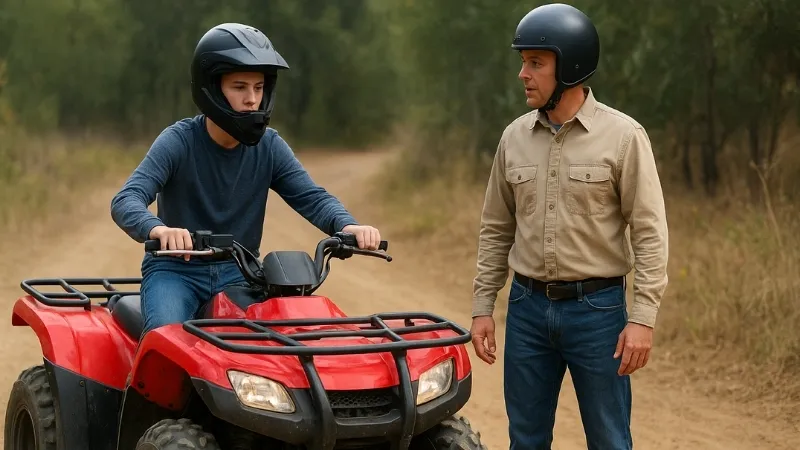
Supervision and Licensing
- Riders under 16 years old must be supervised by an adult at all times when operating on public lands.
- Anyone driving a street-legal ATV must hold a valid Washington driver’s license.
- Teen riders (ages 13–15) can operate on trails with supervision and proper training, but not on public roads unless they meet WATV requirements.
Passenger and Riding Restrictions
- Passengers are allowed only if the ATV is designed to carry more than one person.
- Riders must wear helmets that meet DOT safety standards, and all passengers must do the same.
- Standing or “doubling up” on single-seat ATVs is prohibited on public property.
By enforcing clear age, licensing, and supervision rules, Washington aims to balance safety with the freedom of exploring its off-road landscapes responsibly.
Read: Explore Arizona State ATV Laws and Regulations
Mandatory Safety Equipment and Operation Rules
Safety is non-negotiable when riding in Washington’s diverse terrain—from forested trails to gravel roads. The state enforces strict equipment and operation standards to reduce accidents and ensure responsible ATV use.
You May Want to Read: How to choose an ATV helmet – The Ultimate Buying Guide
Helmet and Eye Protection
All riders and passengers must wear a DOT-approved helmet when operating on public land or roads, unless the ATV is fully enclosed by a cab or roll cage. While not legally required on private land, wearing a premium quality helmet is still strongly recommended.
Riders should also use goggles or a face shield if their helmet doesn’t have a visor—especially when riding on dusty or forested trails.
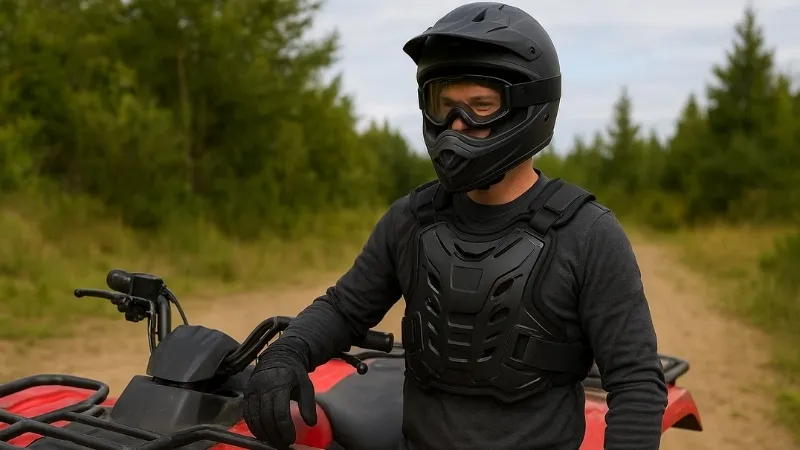
Required Safety Equipment
To operate legally and safely, your ATV must have:
- Working headlight and taillight (for night or low-visibility riding)
- Functional brakes and brake light
- A spark arrestor to prevent wildfire hazards
- Muffler system that meets state noise limits (usually below 86 dB)
These equipment rules apply both to recreational trail riding and to ATVs converted for limited on-road use.
Operating Rules and Restrictions
- Never operate an ATV under the influence of alcohol or drugs.
- Obey posted speed limits and stay on marked trails.
- Use headlights from dusk till dawn or in poor visibility.
- Yield to pedestrians, equestrians, and vehicles when crossing roads or shared-use trails.
These regulations, overseen by the Department of Natural Resources (DNR) and local enforcement agencies, ensure every rider contributes to safer and more sustainable ATV recreation across Washington.
Where You Can Legally Ride ATVs in Washington
Washington offers an incredible mix of forest trails, dunes, and backcountry routes—but not every open space is fair game for ATVs. The state carefully designates where off-road vehicles can operate to protect natural areas and keep recreation safe and organized.
Washington ORV Parks & Public Trails to Explore
The Department of Natural Resources (DNR) manages a wide network of Off-Road Vehicle (ORV) areas throughout Washington. Some of the most popular include:
- Tahuya State Forest (Mason County) – a mix of easy loops and technical forest trails.
- Naneum Ridge State Forest (Kittitas County) – scenic routes connecting to higher-elevation forest roads.
- Reiter Foothills Forest (Snohomish County) – an official DNR-managed ORV park with ATV, dirt bike, and 4×4 zones.
- Liberty ORV Area (near Ellensburg) – well-marked trails for mixed off-road vehicles.
Each site requires a current ORV decal or Discover Pass, depending on land type.
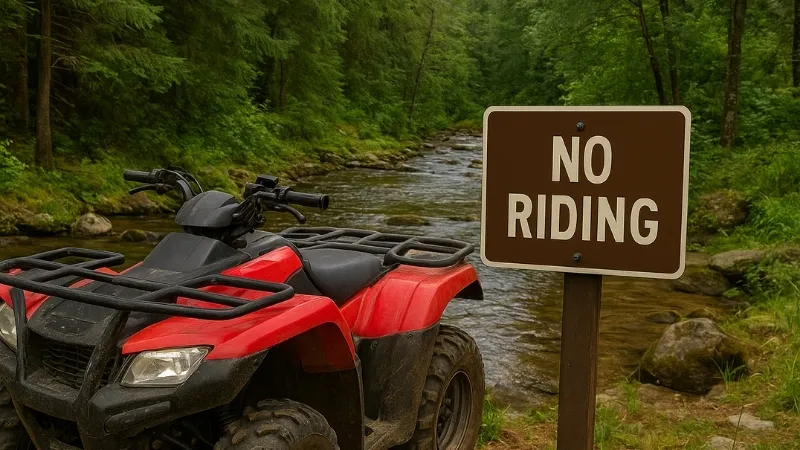
County-Approved Roads and Routes
Some Washington counties—such as Okanogan, Ferry, and Chelan—permit street-legal ATVs (WATVs) on certain low-speed roads. Counties and cities decide individually which routes are open, so riders must check local ordinances before venturing out.
Private Land Use
You can ride on private property with the landowner’s permission. However, registration and safety rules still apply if the property is open to the public or used for organized events.
Prohibited Areas
ATVs are not allowed on National Forest Roads, developed campgrounds, areas where the environment can be harmed, state highways, interstates, or any non-designated public roads. Riding on closed trails or protected areas can result in fines or vehicle impoundment.
Knowing exactly where you can and can’t ride ensures a hassle-free experience—and keeps Washington’s off-road network open and sustainable for future riders.
Environmental and Noise Regulations
Washington’s off-road network runs through forests, wetlands, and wildlife zones—so it’s no surprise that environmental protection is built into the state’s ATV laws. These rules focus on preserving natural habitats, preventing wildfires, and keeping noise pollution in check.
Muffler and Sound Limits
All ATVs must be equipped with an operational muffler and a U.S. Forest Service–approved spark arrestor. You cannot modify the muffler to increase the sound level.
The sound level must not exceed 86 decibels, a standard enforced by both DNR and local law enforcement. Violating these limits can lead to citations or trail bans in sensitive areas.
Trail and Habitat Protection
Riders are strictly prohibited from:
- Operating ATVs in streams, wetlands, or wildlife restoration zones
- Creating new trails or damaging vegetation
- Riding off established ORV routes on public lands
These restrictions, found under RCW 46.09.455, are in place to reduce soil erosion, protect endangered habitats, and maintain trail quality.
Responsible Riding Practices
The state encourages riders to adopt “Tread Lightly” ethics—staying on marked routes, minimizing throttle noise, and packing out waste. Beyond legal compliance, responsible use helps maintain good relationships between riders, land managers, and local communities.
By respecting Washington’s environmental and noise standards, ATV enthusiasts can continue enjoying the trails without risking closures or fines.
Read: Alabama ATV Law Guide: Ride Legally and Avoid Penalty
Penalties for Violating ATV Laws in Washington
Breaking Washington’s ATV regulations can quickly turn an enjoyable ride into a costly mistake. The state enforces fines, impoundment, and sometimes criminal charges for non-compliance. Here’s a clear breakdown:
Common Violations
- Unregistered ATV or missing ORV decal
- Riding without a helmet or safety gear
- Trespassing on private or prohibited public land
- Exceeding sound limits or operating a modified muffler illegally
- Street-legal ATV violations (driving on unapproved roads, no license, no insurance)
Cross-State and Nonresident ATV Use
Washington is a popular destination for ATV riders from surrounding states like Oregon, Idaho, and Montana. Fortunately, the state makes it relatively easy for visitors to ride legally—provided they follow the right permit process.
Nonresident ORV Permits
- Out-of-state riders need to fully register their ATV in Washington. (It is discussed earlier. See how to register your ORV in Washington)
- These permits can be purchased online or from licensed vendors, making them accessible for tourists planning short trips.
Reciprocity Agreements
- Washington recognizes ORV permits from neighboring states. If your ATV is registered in Utah, Oregon, or Idaho, you’ll not need a Washington Nonresident ORV Permit to ride on public lands here with just a Disscovery Pass.
- However, neighboring states that have no reciprocity agreement with Washington must purchase a Washington ATV registration.
Temporary Permits
- For short visits or organized events, Washington allows temporary permits. You can avail it at $15.75, which grants you a ride on an ATV/ORV in Washington for 60 days.
Planning ahead ensures you won’t run into compliance issues while visiting Washington’s ORV parks or forest trails.
Resources and Official References
Navigating Washington’s ATV laws is easier when you know where to look for official updates and guidance. The following resources provide the most accurate and up-to-date information:
- Revised Code of Washington (RCW 46.09) – The primary legal framework for Off-Road Vehicles and Wheeled ATVs.
- Washington Administrative Code (WAC) – Contains additional details and environmental regulations that supplement RCW laws.
- Washington Department of Licensing (DOL) – Handles ATV and ORV registration, decals, and permits.
- Washington Department of Natural Resources (DNR) – Manages public trails, ORV parks, and environmental guidelines for off-road use.
- Washington Department of Fish and Wildlife (WDFW) – Oversees ATV use in state recreation areas and wildlife lands.
- State Parks ORV Program – Offers detailed maps, permit details, and riding area guidelines.
Checking these resources before each riding season is the best way to ensure you’re riding legally.
FAQs About ATV Laws in Washington
Are ATVs street legal in Washington State?
Only if they meet Wheeled All-Terrain Vehicle (WATV) standards. This includes headlights, mirrors, turn signals, and an ORV license plate. Even then, they are limited to county-approved roads.
Do I need insurance for my ATV in Washington?
Insurance is not required for ORV use on trails. However, it may be required for street-legal WATVs depending on county or city regulations. Yes, some ORV parks, not all, want to make sure you are insured for your ATV riding.
Can kids ride ATVs in Washington?
Yes, but minors under 16 must ride under the supervision of an 18-year-old. In addition, he must have a valid driver’s license.
What happens if I ride without an ORV permit?
If you ride without a legat ORV permit, you could face fines allegedly up to $386, license suspension, and risk impoundment of your ATV. So, always carry your ORV decal or nonresident permit.
Final Thoughts: Stay Legal and Ride Smart in Washington
Washington offers some of the most diverse and scenic ATV riding opportunities in the Pacific Northwest, but with that freedom comes responsibility. Riders must stay compliant with registration, safety equipment, and land-use laws to keep access open and safe for everyone.
Before each trip, double-check county-specific ordinances and state regulations, as rules can change from year to year.
By staying informed and respectful of the trails, ATV enthusiasts can enjoy Washington’s rugged backcountry while preserving it for future generations.
Relevant read include:
Guide to Nevada ATV Laws and Regulations
California ATV Laws – An Ultimate Guide

ATVNotes is an off-road resource focused on ATV and UTV winching, recovery systems, safety gear, tires, batteries, and essential off-road equipment. Content is produced by the ATVNotes Expert Team and written from the perspective of a practical off-road recovery advisor, emphasizing real-world performance, system compatibility, and safety-first practices across trail riding, utility use, and off-road exploration.
